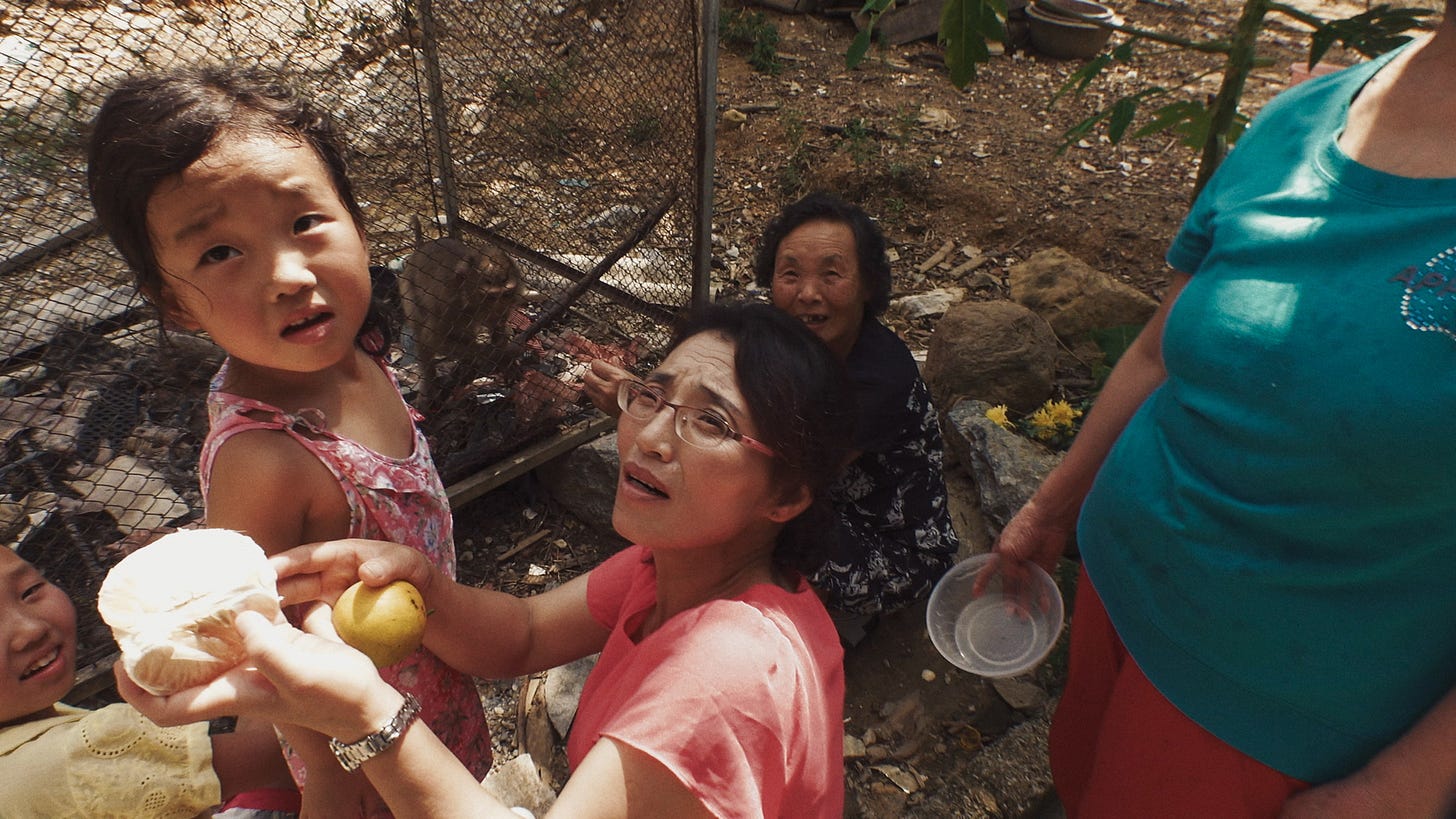Seeing North Korea Clearly
In an important new documentary, some of those who survived and escaped the totalitarian Kim regime share their stories.
ON MY SIXTH BIRTHDAY, I woke up to find an enormous globe next to my bed, a gift from my father. It is the best present I have ever received. My favorite stories as a child were the ones my father read to me aloud about the voyages of Marco Polo, Columbus, and Magellan. Our favorite game was to trace the journeys of these great explorers across this globe. These are the last and fondest memories I have of my father, and this love of exploration was his greatest gift to me.
I like to joke to Americans that I was born in the Deep South, right next to Georgia. The punchline is that it’s the deep south of the Soviet Union. But one difference between my hometown of Baku and, say, Atlanta, is that an American child could realistically expect to be able to travel the world. Barred from traveling by poverty and internal restrictions, most kids in the Soviet Union could only see the world in globes. And yet an even worse prison state exists today.
A new documentary, Beyond Utopia, now viewable on various streaming platforms and freely available on PBS in the United States, tells the story of the escape from North Korea’s dictatorship by the Roh family and fellow defectors Lee Hyeon-seo and Lee So-yeon.1 Directed by Madeleine Gavin, the film is a testament to their courage. The most moving scenes are quiet interviews with the survivors, who speak frankly about the false utopia they escaped. (Full disclosure: I serve as the chairman of the Human Rights Foundation, which executive-produced Beyond Utopia, but I had no involvement or decision-making role in any aspect of the project.)
Solzhenitsyn returned from the gulag with the warning to live not by lies. The Roh family, Hyeon-seo, and So-yeon have come from hell on earth to offer us the same warning. By telling the truth about their experiences, they defy all the power of the dictatorship that once ruled every aspect of their lives.
Their story resonated deeply with me. As a rising chess champion, my attainments gave me a chance to see life beyond the evil empire. Although kept under close watch by my KGB handlers, I still managed to have my first encounters with freedom as a teen. I found them exhilarating.
In the USSR, thoughts could be crimes, and every word you said could become a weapon against you. In the free world, I found, you could speak your mind and not worry about hearing a knock at the door later. In the Soviet Union, your life and labor were tools for the benefit of the state. In the free world, your achievements and mind were your own. Realizing these things helped me understand that the Soviet empire would not long survive.
By 1985, when I became world champion, young people across the Soviet Union were demanding glasnost and perestroika. By 1990, the bankrupt Soviet Union had abandoned Communist ideology and its North Korean puppet to ask capitalist South Korea for loans. Communism and totalitarianism had lost to the free market and liberal democracy. Given recent events, it should come as no surprise that North Korea has reestablished close relations with Russia under Putin’s dictatorship.

The messages of the Roh family, Hyeon-seo, and So-yeon are timely. The United States so decisively won the battle against communism that Americans today are growing up as political hothouse flowers, insulated from global geopolitical realities and threats to democracy. Some of the more foolish cannot even see enemies except within their own country. While North Koreans risk everything to escape from hell, some Americans are so blind to the dangers of dictatorship that they voluntarily run away to North Korea.
Just last week, the Kim regime sentenced two 16-year-olds to twelve years hard labor in a prison camp for watching K-dramas and other South Korean media. For many Americans who have never known anything but freedom and democracy, the existence of true evil in the world is so difficult to comprehend that they simply deny it exists. They take democracy for granted and accept totalitarian propaganda uncritically.
Malicious or simply ignorant left-wing activists deny Hamas’s atrocities, defend Putin, and ignore Xi’s genocide against the Uyghurs while declaring the United States the world’s greatest evil. Meanwhile, conservative activists and elected Republicans side with Putin and undermine Ukrainian democracy.
Unlike these armchair activists, I have been on the other side of a totalitarian curtain. I have been beaten by Putin’s police. I have marched and protested for democracy and spent nights in a Russian jail cell. And my friends and allies in the struggle have suffered far worse, from years of imprisonment to poisoning and street execution.
The least we can do is listen to them. Listen to the dissidents, the witnesses, the escaped who can finally speak freely. They will tell you that there is hell on Earth, and that dictators make it their goal to export that hell everywhere.
Listen to these North Korean survivors. Their stories are testaments to the failures of totalitarianism and to the indomitable human soul. Beyond Utopia bears witness to the human will to life and reminds us that freedom is a precious gift. It is our duty to protect it.
Beyond Utopia was shortlisted for consideration for Best Documentary Feature at the 2024 Academy Awards, although it was not ultimately nominated. While Oscar pundits have been busy wagging their tongues about the “snub” suffered by Barbie—it received only eight nominations, including one for Best Picture—few have noted that the Academy missed out on an opportunity to highlight a real-life tale of human triumph.




